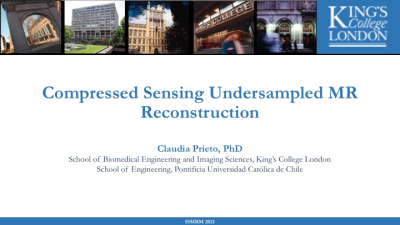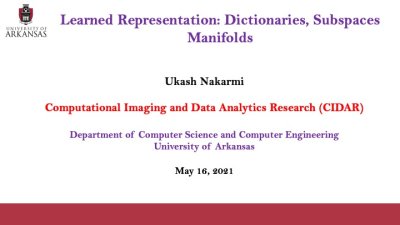Weekend Course
Image Reconstruction
ISMRM & SMRT Annual Meeting • 15-20 May 2021

| Concurrent 4 | 13:45 - 14:30 | Moderators: Dong Liang & Teresa Correia |
| Parallel Imaging
Kathleen Ropella-Panagis
Parallel imaging refers to a set of techniques used to accelerate MRI acquisitions. Parallel imaging experiments include (1) a reduced amount of acquired k-space data to decrease scan time, (2) multi-channel RF coils for spatial encoding, and (3) a reconstruction algorithm. This talk covers three common parallel imaging reconstruction algorithms: SENSE, GRAPPA, and SPIRiT. Acceleration factor and SNR are also discussed. This presentation includes a MATLAB app to explore parallel imaging.
|
||
| Reconstruction of Non-Cartesian Data
Jakob Assländer
Today, most clinical scans are performed with Cartesian k-space sampling due to its robustness and ease to implement acquisition and reconstruction. However, there are numerous reasons to use non-Cartesian sampling methods, reasons that range from robustness to motion and flow, to less intrusive undersampling artifacts and more beneficial properties for advanced image reconstruction methods such as compressed sensing. This lecture covers the basics of image reconstruction with the non-uniform FFT. The talk itself discusses the concepts and the underlying theory and is accompanied by exercises that can be done online in a browser (see syllabus for details). |
||
 |
Compressed Sensing
Claudia Prieto
Compressed sensing MRI reconstruction techniques have transformed the field and have been investigated in many clinical applications during the last decade to speed up MRI scans. This talk introduces the three key components of Compressed Sensing - sparsity, incoherence and non-linear reconstruction - and discusses how these key components are implemented in MRI. The combination of Compressed sensing with parallel imaging is briefly discussed. Current challenges of Compressed sensing are summarised and more recent developments in deep learning based reconstruction (proposed to overcome some of these challenges) are briefly introduced.
|
|
 |
Learned Representations: Dictionaries, Subspaces, Manifolds
Ukash Nakarmi
Efficient representation is the key to reconstructing high-quality images from accelerated data acquisition in magnetic resonance imaging (MRI). In this talk, I will present the important paradigms in representation learning for accelerated MRI and how such representations can be used to solve ill-posed problems in MR image reconstruction.
|
|
| Low-Rank & Structured Low-Rank Reconstruction Approaches
Mark Chiew
This talk will provide some intuition behind low-rank methods and an overview of the mechanics involved in reconstruction. We will first present some background on low-rank matrices, then cover general low-rank methods, and finally we will discuss structured low-rank methods.
|
||
| Neural Networks in MR Image Reconstruction Video Permission Withheld
Shanshan Wang
|
The International Society for Magnetic Resonance in Medicine is accredited by the Accreditation Council for Continuing Medical Education to provide continuing medical education for physicians.